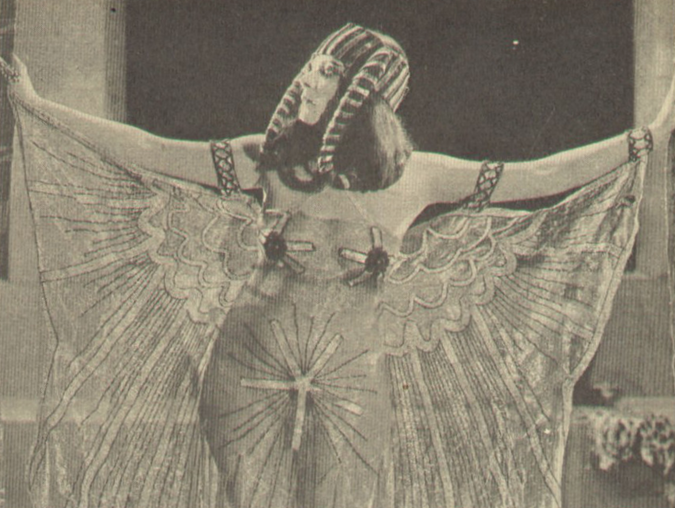The 28-year-old studio executive who helped Hollywood survive its first pandemic

Graphic by Angelie Zaslavsky
The Spanish flu pandemic hit Hollywood hard. The lethal flu strain killed approximately 650,000 U.S. citizens from 1918-19, and threatened to collapse the nascent movie industry.
One year before the outbreak, my great-grandfather, pioneer producer Sol M. Wurtzel, arrived to run the original Fox Studio at Sunset Blvd. and Western Ave.
Sol had personally experienced the flu’s devastation before it spread west. On August 24, 1918, his beloved mother Pauline died in New York at age 50 — a victim of the virus ravaging the crowded tenements of his native Manhattan. A continent away, Sol suffered through the guilt of not being able to reach her bedside or attend her funeral.
He already felt overwhelmed by his boss William Fox’s mandate to crank out dozens of films at a time when the federal government had drafted 25% of his lot’s hardest working men to serve in World War I. That grim Spanish flu September of 1918, 28-year-old Sol also shouldered the responsibility of protecting hundreds of employees on the lot from the virus while continuing to turn a profit. The flu hit 20-40-year-olds hardest – the demographic of most Fox employees.
So how did Sol do it?
An anxious kind of guy, he worked 18-hour days running the studio on caffeine and cigar fumes. He felt relief after Los Angeles County Public Health Commissioner Dr. Luther Powers declared a state of emergency on October 11, ordering the closure of movie theaters and other public gathering places. Dr. Powers also forbade producers from filming crowd scenes. The doctor’s orders made it easier for Sol to protect his flock of actors, directors, scenario writers, and studio hands from contracting the deadly disease.
Three days later, his profit-at-all-costs, New York-based boss Fox reluctantly agreed to join 17 other movie studios and distribution companies to suspend production and release no new films for a four-week period. L.A.’s movie theaters didn’t reopen until December 2, 1918. The production stoppage and theater closures gave Sol crucial time to breathe and regroup.
As under-financed film studios permanently shuttered due to the one-two punch of global war and pandemic, Fox knew the survival of his company, particularly the Hollywood lot, depended on penny-pinching pragmatism – a philosophy he drilled into young Sol’s brain.
In early 1918, Fox wrote Sol, “Go over your general payrolls … and cut wherever possible … lay off all unnecessary people. I realize … it will mean that men who have been with us for years will have to suffer, but this cannot be helped, it is far better that a few shall suffer than have to shut down our plant and have all suffer.”
Sol followed Fox’s orders. He laid off almost all employees and persuaded Fox’s biggest cowboy star Tom Mix to take four weeks unpaid leave.
When the cameras began to roll again, Sol took calculated risks to minimize financial and human losses. He produced a raft of inexpensive Westerns starring established box-office draw Mix and his wonder horse Tony performing their daredevil equestrian stunts in the great outdoors. Nearby locations like Griffith Park provided plenty of fresh air and wide-open, crowd-free spaces.

Sol, his wife Marian and five-year-old daughter Lillian Wurtzel greet box-office sensation
Theda Bara (holding bouquet) at Los Angeles’s Santa Fe Station in 1918. Image by Sharon Rose Leib
Theda Bara, Fox’s other huge box-office draw, came to the rescue in more ways than one. Her willingness to reveal flesh in diaphanous gowns—scandalous in early Hollywood — and take risks like filming 1918’s “The She-Devil” on the lot helped the studio stay afloat. She also bravely visited local WW I veterans’ hospitals as the Spanish flu raged. Bara, neé Theodosia Goodman, the daughter of a Jewish tailor from Cincinnati, refused to wear a face mask when greeting the returned soldiers – believing the ailing vets deserved the full star treatment.

Theda Bara in Cleopatra Image by Theda Bara
The 1918 pandemic inspired Fox to try a new strategy – the reissue. In the pre-air-conditioning era of the early 1900s, studios tended toward light summer release schedules because moviegoers didn’t want to be cooped up in hot, stuffy theaters. This held especially true in the summer of 1918 when the public wanted to avoid potentially germ-infested indoor settings. Rather than make new films, Fox saved production costs by shipping a few old Theda Bara films out to theaters. Bara reissues also came in handy January and February of 1919 to plug holes left by the late 1918 production ban.

Sol Wurtzel reviewing production notes on the Fox Hollywood lot with his boss William Fox’s portrait looming behind him (circa 1919) Image by Sharon Rose Leib
The Fox organization emerged from the hellish years of 1918-19 on solid financial ground, well-positioned to meet the Roaring 1920s’ pent-up demand for motion pictures. As the post-war, post-pandemic economy grew, the film industry soared, becoming one of the most profitable businesses in the country.
Sol’s family also grew. His wife Marian gave birth to a son in June 1921. They named the baby Paul, after Sol’s dear mother Pauline who died of Spanish flu three years prior.
However, the unrelenting stress Sol experienced in 1918 marked him for life. He developed chronic constipation and a facial tic that curled one side of his mouth into a lopsided, nervous smile. Nevertheless, he persisted for 30 more years – producing hundreds of movies for Fox and its successor 20th Century Fox through the late 1940s.
By employing the 3 Rs — reducing costs, reusing tried and true stars and recycling old films — Sol Wurztel weathered the Spanish-flu storm and, like his Western action heroes, helped save the day.
























